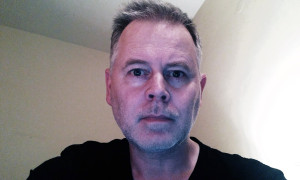For Dust Thou Art 1
The paper will explore the use of Atomic Force Microscopy for uncovering lost tales and histories through subtle audience interaction. The focus is the Spectre2 (Phillips, M. 2012) project that builds on a portfolio of data driven work and ‘nano’ art developed by the author and collaborators.These projects explore the ubiquity of data streamed from an instrumentalised world and its potential as a material for manifesting things that lie outside of the normal frames of reference – things so far away, so close, so massive, so small and so ad infinitum.
Spectre suggested that the Schauraum gallery in the Museum Quartier of Vienna is a ‘psychometric’ architecture and that the memories of the building are bonded to its fabric by the atomic forces that were unlocked by the Atomic Force Microscope. Psychometry, “The concept of objects (or places) seeming to record events and then play them back for sensitive people is generally referred to as psychometry. The objects can be called psychometric objects or token objects”3 (Morris, R. 1986).
Spectre draws on the experiences of Professor Gustav Adolf Schwaiger, the Technical Director of the Austrian Broadcast Corporation, and his collaboration with famous medium Rudi Schneider in the late 1930’s to the early 1940’s. Spectre extends Schwaiger’s ectoplasmic experiments by broadcasting live feeds from the space of the Schauraum and simultaneously replaying the physical remnants of these happenings as captured in the atomic forces binding the dust from their laboratory.
Through their presence visitors could literally ‘see the world in a grain of sand’.4
1: Genesis 3:19
2: Phillips, M. ‘spectre [ˈspɛktə/]’, Schauraum. Quartier21 (Electric Avenue), MuseumsQuartier, Museumsplatz 1/5, 1070 Wien, Austria. 27.01-18.03.2012.
3: Robert L. Morris (Koestler Chair of Parapsychology at the University of Edinburgh 1985 to 2004) in a letter to the artist 21 October 1986.
4: Songs of Innocence and Experience: with Other Poems. Blake, W. 1866. Songs of Innocence and Experience: with Other Poems. [Online]. London: Basil Montagu Pickering. [10/01/14]. Pp96.
Mike Phillips is Professor of Interdisciplinary Arts at Plymouth University. He is the Director of Research at i-DAT (i-dat.org), an Arts Council England National Portfolio Organisation. His R&D orbits digital architectures and transmedia publishing, and is manifest in a series of ‘Operating Systems’ (www.op-sy.com) that dynamically manifest ‘data’ as experience to enhance perspectives on a complex world. Phillips has developed an international portfolio of data driven work and ‘nano’ art projects that explore the ubiquity of data streamed from an instrumentalised world and its potential as a material for manifesting things that lie outside of the normal frames of reference – things so far away, so close, so massive, so small and so ad infinitum. He manages the FulDome Immersive Vision Theatre (IVT), a transdisciplinary instrument for the manifestation of material, immaterial and imaginary worlds and is co-editor of Ubiquity, The Journal of Pervasive Media:www.ubiquityjournal.net/
